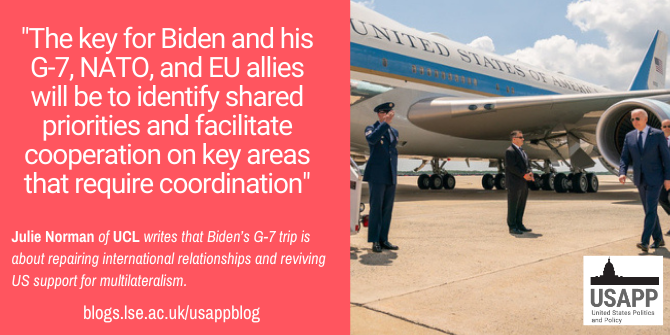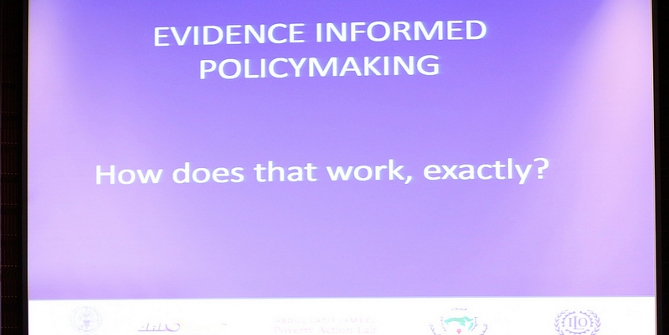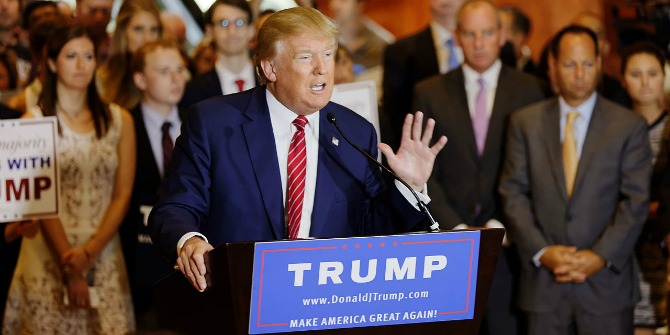 Joe Biden’s first overseas trip as president begins this week with the G-7 summit in the UK. Julie Norman writes that Biden’s has two aims for this trip: shoring up relationships with allies to promote US multilateralism, and reaffirming democratic values among the G-7, NATO, and the EU in opposition to China and Russia.
Joe Biden’s first overseas trip as president begins this week with the G-7 summit in the UK. Julie Norman writes that Biden’s has two aims for this trip: shoring up relationships with allies to promote US multilateralism, and reaffirming democratic values among the G-7, NATO, and the EU in opposition to China and Russia.
What will Biden’s first international trip include?
President Joe Biden kicks off his international travel this week, heading to the UK, to first meet with British Prime Minister Boris Johnson, then joining the G-7 summit in Carbis Bay in Cornwall. Along with the UK and the US, the G-7 consists of Canada, France, Germany, Italy, and Japan, and this year also includes guests Australia, India, South Africa, and South Korea. Biden will also meet with the Queen before departing the UK for Brussels next week, where he will attend the NATO summit and meet with EU officials. He will then continue to Geneva where he will hold his first face-to-face meeting with Russian President Vladimir Putin.
Why is the trip significant?
As the first overseas engagement of the Biden administration, the trip represents Biden’s first major opportunity to articulate his foreign policy and mark a shift in both style and substance from his predecessor, Donald Trump. The G-7 also marks the first in-person meeting of world leaders since before the COVID-19 pandemic, marking a return to high level face-to-face diplomacy. This week’s meetings also bring a different level of urgency than previous years with the summit set to address pressing issues arising from the pandemic, including international vaccine distribution and global economic recovery.
What will be on Biden’s agenda?
Biden’s aims for the trip are twofold. First, he will be looking to shore up relationships with key allies and partners in an attempt to restore US support for multilateralism that declined during the Trump administration. That will include affirming the commitment of the US to NATO, and working with G-7 counterparts on areas of shared concern including global health, security, climate change, and economic recovery. Biden will also seek to build on the commitments made by the G-7 finance ministers last week to push for a global minimum corporate tax rate, which is part of his economic plan for financing his domestic agenda.

“P20210527AS-0312” by The White House is US government work
Second, Biden has stated that his trip will seek to “demonstrate the capacity of democracies to both meet the challenges and deter the threats of this new age.” Echoing themes from the G-7 foreign ministers’ meeting last month, Biden will be looking to the G-7, NATO, and the EU to bolster democratic values, in contrast to what the administration views as the authoritarian visions of both China and Russia. Regarding China, US Secretary of State Antony Blinken stated that the US did not want to hold China down, but would not allow it to undermine the rules-based world order, citing tensions over trade and espionage. As for Russia, Biden will be looking to stabilise the tense relationship and build on areas of cooperation such as arms control but will also likely address cyberattacks and Russian aggression in Ukraine.
Can Biden revive multilateralism?
Biden’s multilateralism agenda comes at a time of perceived rising nationalism in Europe, and on the heels of Trump’s “America First” policy that drove much of his support. Further, the US and some of its closest allies in Europe have diverging interests on many issues that may complicate joint decisions, including how to best engage with China and Russia. The key for Biden and his G-7, NATO, and EU allies will be to identify shared priorities and facilitate cooperation on key areas that require coordination, while seeking complementary foreign policies that are in line with respective national interests.
Please read our comments policy before commenting.
Note: This article gives the views of the author, and not the position of USAPP – American Politics and Policy, nor the London School of Economics.
Shortened URL for this post: https://bit.ly/3w8cQAi
About the author
 Julie Norman – UCL
Julie Norman – UCL
Julie Norman (@DrJulieNorman2) is a Lecturer in Politics and International Relations at UCL and Deputy Director of the UCL Centre on US Politics (@CUSP_ucl).






